China Brands, Marketing & Consumers
Why Is Want Want So Popular in China? The Remarkable Revival of an Iconic Brand
We explain why the 60-year-old Want Want brand became the ‘hot kid’ on the block on Chinese social media this year.
Published
2 years agoon
By
Tucker Jiang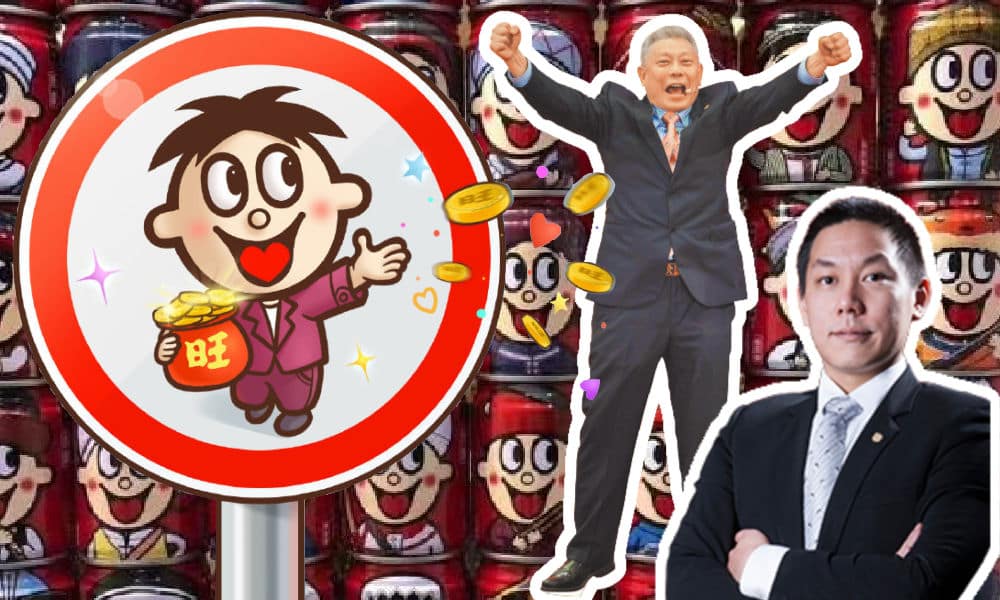
Want Want – you probably know their rice crackers with the cute kid icon – is celebrating its 60th anniversary this year. How did this decades-old brand become all the rage recently in China? From Pelosi to pickles, there is more to it than nostalgia and its cute ‘Hot Kid’ alone.
Wang Wang (旺旺), better known as ‘Want Want’ in English, has become all the rage in China in recent months. In its September issue, the Chinese magazine China Marketing (销售与市场) listed Want Want as the number one brand on its marketing noticeboard hot brand list, referring to it as “‘Lonely Warrior’ Want Want” (‘孤勇者’旺旺).
The Want Want Group (旺旺集团) is the most well-known rice cracker maker in China and one of the largest food and beverage makers in the region.
Want Want is a brand that many Chinese millennials grew up with. The Taiwanese company behind Want Want has a history that dates back to 1962. After becoming the dominant rice cracker maker in Taiwan with a market share as high as 95%, founder Tsai Eng-meng (蔡衍明) looked across the Strait and officially ventured into the mainland market in 1992.
Why is the Want Want brand still so popular in mainland China today? The brand’s success directly goes back to Tsai Eng-meng, who undeniably is a marketing genius with a peculiar style. The Want Want company icon, officially named Wang Zai (旺仔) in Chinese and ‘Hot Kid’ in English, was created in 1979 and depicts a kid with wide open arms and legs, rolling his eyes (fun fact: Hot Kid never looks straight at you).

Want Want Group CEO Tsai with the Want Want icon ‘Hot Kid.’ Image via https://turnnewsapp.com/wd/74725.html.
With its catchy name and distinctive icon, Want Want soon became a household brand in China. Adding to the brand’s popularity are the many commercials throughout the years that show the brand’s style, standing out due to their simplicity and fun energy.
Some of these advertising campaigns have become part of the collective popular memory of Chinese millennials. On the Chinese video site Bilibili, old Want Want commercials bring up nostaligc feelings and still receive millions of views today (see this famous one, or see a collection of classic Want Want commercials on Bilibili here).
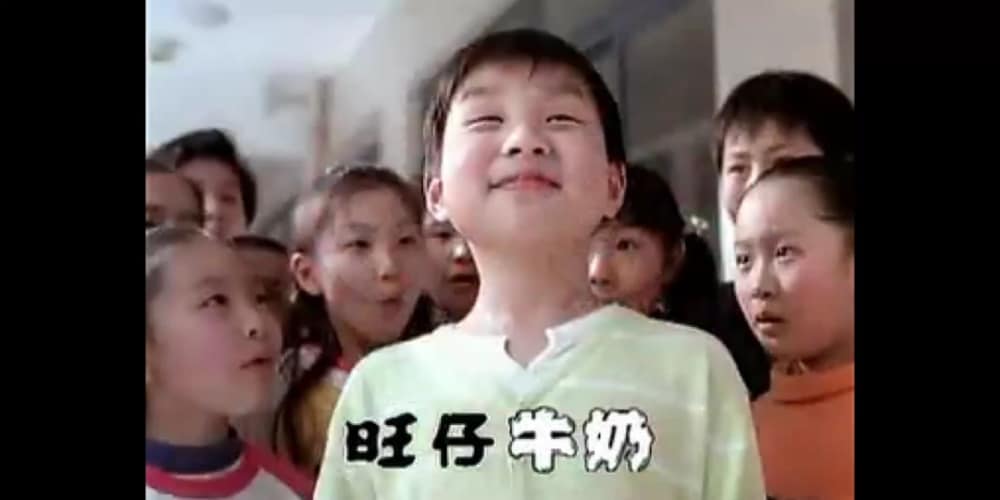
From one of Want Want’s iconic commercials.
Ingenious strategies brought great success to the company from the start and subsequently ushered in “the golden decade” for Want Want from 2004 to 2013, making Tsai the richest man in Taiwan for three consecutive years.
Apart from Want Want’s signature rice cracker products, products such as Hot Kid Milk (旺仔牛奶), Lonely God Potato Chips (浪味仙), and QQ Gummies (旺仔QQ糖) also became household names in the mainland.
However, facing more competition and failing to keep up with Chinese customers’ evolving consumption habits and preferences, Want Want was stuck in a bottleneck period and its sales slowed down after 2014. Its recent comeback and sudden social media success have everything to do with Nancy Pelosi’s controversial Taiwan visit in August of 2021.
A ‘GOOD’ TAIWANESE COMPANY
On July 28, Tsai Wang-Chia (蔡旺家), Tsai Eng-meng’s second son and Want Want’s Chief Operating Officer and executive director, posted three single words on his Weibo account (@Matt旺家): “YOU GO AWAY.”

The text was accompanied by a photo of an old witch, which just so happens to be the nickname Chinese netizens gave to Pelosi, and the timing of the post was right when reports about the U.S. House Speaker’s potential Taiwan visit were coming out. Want Want soon became a hot topic afterward.
People had already been paying more attention to Tsai Wang-chia’s Weibo account in light of the then-ongoing calls to boycott Taiwanese companies on Chinese social media following rumors regarding Pelosi’s controversial visit.
Someone claiming to be an employee at Want Want then posted on the popular Red (Xiaohongshu) app, defending Want Want for being a “good Taiwanese company,” asking people to “please don’t hurt us by mistake.” This triggered a public campaign of digging into Tsai’s previous posts, and netizens soon discovered that the Want Want executive director had published similar posts before.
In March of 2022, when a U.S. delegation visited Taiwan, Tsai bluntly posted: “The American pigs have arrived in Taiwan” (“美国猪到台湾了“).
Because of his consistent patriotic and pro-unification stance, coupled with a down-to-earth personality and plain-spoken style despite being an heir of a multibillion dollar family, Tsai Wang-chia soon won the hearts of millions of Chinese netizens.

Tsai Wang-Chia (蔡旺家) and ‘Hot Kid’ (旺仔)
The hype got so so big that people started claiming that the figure of Want Want, the iconic Hot Kid, was actually based on Tsai Wang-chia as a child – despite the fact that ‘Hot Kid’ was created in 1979 while Tsai Wang-Chia was born in 1984.
PATRIOTIC ‘PRESIDENT WANT’
Tsai’s pro-unification sentiments seem to run in the family. Want Want founder Tsai Eng-meng, who is also commonly referred to as ‘President Want’ (旺董), has long been a unification supporter. This is also reflected in his business empire, which includes the Want Want China Times Group (旺旺中时媒体集团) that owns dominant pan-Blue (pro-China) media outlets in Taiwan.
Various videos, which soon widely circulated online, also showed ‘President Want’ expressing gratitude for the “great market of the mainland” (“因为有大陆这个伟大的市场,才造就了我旺旺的今天”) and proudly declaring that all Want Want employees are “impressive and dignified Chinese people” (堂堂正正的中国人).
To the delight of many Chinese netizens, more events and incidents showing Want Want’s patriotic stance were brought to light one after another.
The company filed for IPO on the HK Stock Exchange in 2008 with the name “Want Want China Holdings Limited” (中国旺旺控股有限公司); its Want Want Hospital in Hunan (湖南旺旺医院) was among the first private institutions to send a medical aid team to Wuhan during the initial COVID outbreak in the city; in 2019, when a Taiwanese celebrity mockingly said on a local program that “mainlanders cannot afford to eat pickles”, its newspaper Want Daily (旺报) published a conspicuous headline on its August 18 frontpage saying “MAINLANDERS CAN AFFORD TO EAT PICKLES!” (“大陆人吃得起榨菜!”), noting on the side: “Taiwanese are Chinese. We are from the same country and therefore should support each other.” (“台湾人就是中国人. 我们都是同一国的,所以当然要相挺.”)
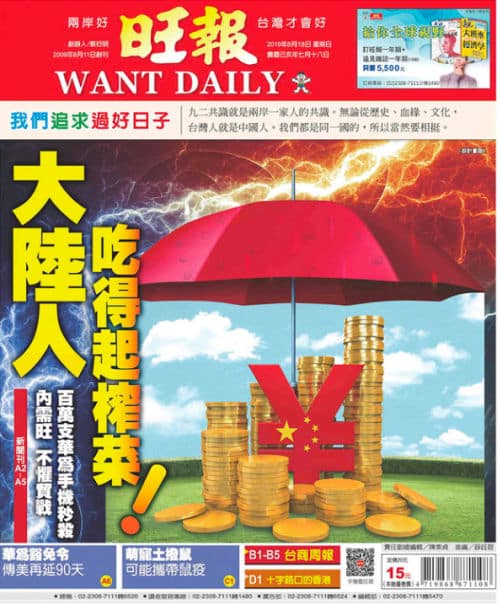
In early August of this year, Want Want soared to the top of Weibo’s trending list, and netizens swarmed its live stream channel on Taobao, vowing to “consume wildly” (“野性消费”) and “empty their stock” (“清空库存”) in support of the brand.
According to the Time Weekly (时代周报), a government-owned newspaper from Guangzhou, the number of viewers on the channel that day reached almost 100,000 – up to ten times more than what the channel usually received in viewers, – and sales of its online shop spiked as many new customers came in after following the trending hashtag.
THE OTHER SIDE OF THE COIN
In contrast to Want Want’s fervent popularity in mainland China, the brand has become more controversial on the other side of the Taiwan Strait, especially in light of its ownership of multiple leading media outlets, with many expressing worries that its dominant position might impact press freedom.
In June of 2019, a predominantly young mass rallied against so-called “red media” (Taiwanese media in favor of Beijing), with Want Want-owned newspapers (China Times 中国时报 and Want Daily 旺报) and TV channels (China Television 中国电视公司 and CTiTV 中天电视台) being among the main targets.
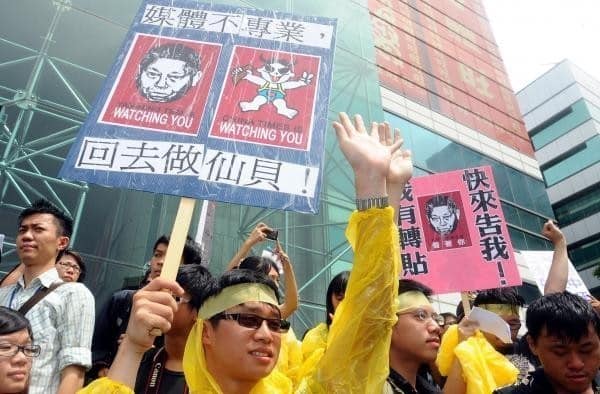
Protesting against Want Want and other ‘pro-China’ companies in Taiwan, image via https://news.ltn.com.tw/news/life/breakingnews/2859708
The following month, the Financial Times published an article, quoting anonymous journalists working for these outlets, saying that their editorial managers took direct instructions from Beijing’s Taiwan Affairs Office, a claim that the Want Want China Times Group later responded to as “malicious slander.”
In late 2020, the Tsai Ing-wen administration stripped CTiTV of its broadcast license upon renewal out of concerns about editorial interference by President Want Tsai Eng-meng. Such a ruling was a first since the founding of Taiwan’s National Communications Commission in 2006, a government body that regulates the industry, and evoked opposition from the ‘Blue Camp’ and controversy among the public.
SUCCESSFUL ON ALL FRONTS
Despite receiving criticism in Taiwan, Want Want has continued its success in mainland China. This year, Want Want is celebrating the company’s 60th anniversary, as well as the 30th year anniversary of the opening of its first factory in mainland China.
China Marketing wrote about Want Want’s 2022 success that “consistency is key” in marketing. Not only did the brand stick with its original logo and traditional products such as rice crackers and its dairy drink, it has also focused on nostalgic or playful ad campaigns throughout the years (think of its successful slogan “You Want, I Want, Everyone Wants” “你旺、我旺、大家旺.”)
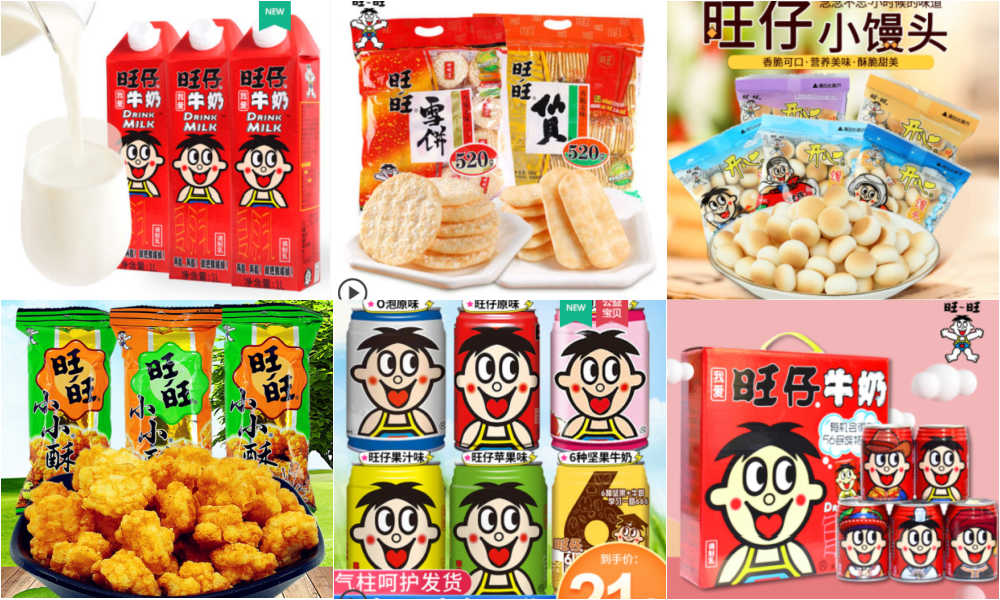
Want Want products for sale on Taobao.
At the same time, the company is not afraid to launch new products and stay active in the world of Chinese social media and e-commerce.
But what has really become an essential point in its regained success this year is the brand’s consistency in delivering a patriotic message through multiple channels that resonated with Chinese consumers at a time of deteriorating US-China relations and more focus on cross-strait relations.
Erke, the Chinese sportswear brand by Hongxing Erke Group (鸿星尔克), was also brought back into the limelight in 2021 after they donated 50 million yuan ($7.7 million) to the Henan flood efforts. When people found out that the relatively low-profile brand donated such a high amount of money to help the people in Henan despite its own losses, its online sales went through the roof – everyone wanted to support this generous ‘patriotic brand.’
While nationalistic consumer sentiments matter, being a ‘patriotic brand’ alone is not enough; it eventually is the combination of being consistent and authentic, delivering popular products, and having a strong marketing campaign. When it comes to the mainland market, Want Want tackled all fronts this year.
In October of 2022, Want Want celebrated China’s National Day by using drones to project netizens’ hopes and wishes for the future all over the Great Wall, including a projection of a giant Want Want drink (#旺旺把爱国刻进了DNA#).

For now, Want Want has practically made ‘loving China’ a part of its brand. Mixing rice crackers with some nationalism is turning out to be a recipe for success – at least in the mainland.
By Tucker Jiang, with contributions by Manya Koetse
Get the story behind the hashtag. Subscribe to What’s on Weibo here to receive our weekly newsletter and get access to our latest articles:
Spotted a mistake or want to add something? Please let us know in comments below or email us. First-time commenters, please be patient – we will have to manually approve your comment before it appears.
©2022 Whatsonweibo. All rights reserved. Do not reproduce our content without permission – you can contact us at info@whatsonweibo.com.
China Arts & Entertainment
Controversial Wanghong Livestreamers Are Becoming a Weibo Staple in China
‘Wanghong’ was a mark of online fame; now, it’s increasingly tied to controversy and scandal.
Published
3 months agoon
October 27, 2024
As livestreaming continues to gain popularity in China, so do the controversies surrounding the industry. Negative headlines involving high-profile livestreamers, as well as aspiring influencers hoping to make it big, frequently dominate Weibo’s trending topics.
These headlines usually revolve around China’s so-called wǎnghóng (网红) influencers. Wanghong is a shortened form of the phrase “internet celebrity” (wǎngluò hóngrén 网络红人). The term doesn’t just refer to internet personalities but also captures the viral nature of their influence—describing content or trends that gain rapid online attention and spread widely across social media.
Recently, an incident sparked debate over China’s wanghong livestreamers, focusing on Xiaohuxing (@小虎行), a streamer with around 60,000 followers on Douyin, who primarily posts evaluations of civil aviation services in China.

Xiaohuxing (@小虎行)
On October 15, 2024, at Shenzhen Bao’an International Airport, Xiaohuxing confronted a volunteer at the automated check-in counter, insisting she remove her mask while livestreaming the entire encounter. He was heard demanding, “What gives you the right to wear a mask? What gives you the right not to take it off?” and even attempted to forcibly remove her mask, challenging her to call the police.

During the livestream, the livestreamer confronted the woman on the right for wearing a facemask.
He also argued with a male traveler who tried to intervene. In the end, the airport’s security officers detained him. Shortly after the incident, a video of the livestream went viral on Weibo under various hashtags (e.g. #网红小虎行机场强迫志愿者摘口罩#) and attracted millions of views. The following day, Xiaohuxing’s Douyin account was banned, and all his videos were removed. The Shenzhen Public Security Bureau later announced that the account’s owner, identified as Wang, had been placed in administrative detention.
On October 13, just days before, another livestreaming controversy erupted at Guangzhou Baiyun International Airport. Malatang (@麻辣烫), a popular Douyin streamer with over a million followers, secretly filmed a young couple kissing and mocked them, continuing to film while passing through security—an area where filming is prohibited.
Her livestream quickly went viral, sparking discussions about unauthorized filming and misconduct among Chinese wanghong. In response, Malatang’s agent posted an apology video. However, the affected couple hired a lawyer and reported the incident to the police (#被百万粉丝网红偷拍当事人发声#). On October 17, Malatang’s Douyin account was banned, and her videos were removed.

Livestreamer Malatang making fun of the couple in the back at the airport.
In both cases, netizens uncovered additional examples of inappropriate behavior by Xiaohuxing and Malatang in past broadcasts. For example, Xiaohuxing was reportedly aggressive towards a flight attendant, demanding she kneel to serve him, while Malatang was criticized for scolding a delivery person who declined to interact with her on camera.
Comments on Weibo included, “They’ll do anything for traffic. Wanghong are getting a bad reputation because of people like this.” Another added, “It seems as if ‘wanghong’ has become a negative term now.”
Rising Scrutiny in China’s Wanghong Economy
Xiaohuxing and Malatang are far from isolated cases. Recently, many other wanghong livestreamers have also been caught up in negative news.
One such figure is Dong Yuhui (董宇辉), a former English teacher at New Oriental (新东方) who transitioned to livestreaming for East Buy (东方甄选), where he mixed education with e-commerce (read here). Dong gained significant popularity and boosted East Buy’s brand before leaving to start his own company. Recently, however, Dong faced backlash for inaccurate statements about Marie Curie during an October 9 livestream. He incorrectly claimed that Curie discovered uranium, invented the X-ray machine, and won the Nobel Prize in Literature, among other things.
Considering his public image as a knowledgeable “teacher” livestreamer, this incident sparked skepticism among viewers about his actual expertise. A related hashtag (#董宇辉称居里夫人获得诺贝尔文学奖#) garnered over 81 million views on Weibo. In addition to this criticism, Dong is also being questioned about potential false advertising, which is a major challenge for all livestreamers selling products during their streams.

Dong Yuhui (董宇辉) during one of his livestreams.
Another popular livestreamer, Dongbei Yujie (@东北雨姐), is currently also facing criticism over product quality and false advertising claims. Originally from Northeast China, Dongbei Yujie shares content focused on rural life in the region. Recently, her Douyin account, which boasts an impressive 22 million followers, was muted due to concerns over the quality of products she promoted, such as sweet potato noodles (which reportedly contained no sweet potato). Despite issuing public apologies—which have garnered over 160 million views under the hashtag “Dongbei Yujie Apologizes” (#东北雨姐道歉#)—the controversy has impacted her account and led to a penalty of 1.65 million yuan (approximately 231,900 USD).

From Dongbei Yujie’s apology video
Former top Douyin livestreamer Fengkuang Xiaoyangge (@疯狂小杨哥) is also facing a career downturn. Leading up to the 2024 Mid-Autumn Festival, he promoted Hong Kong Meicheng mooncakes in his livestreams, branding them as a high-end Hong Kong product. However, it was soon revealed that these mooncakes had no retail presence in Hong Kong and were primarily produced in Guangzhou and Foshan, sparking accusations of deceptive marketing. Due to this incident and previous cases of misleading advertising, his company came under investigation and was penalized. In just a few weeks, Fengkuang Xiaoyangge lost over 8.5 million followers (#小杨哥掉粉超850万#).

Fengkuang Xiaoyangge (@疯狂小杨哥) and the mooncake controversy.
It’s not only ecommerce livestreamers who are getting caught up in scandal. Recently, the influencer “Xiaoxiao Nuli Shenghuo” (@小小努力生活) and her mother were arrested for fabricating a tragic story – including abandonment, adoption, and hardships – to gain sympathy from over one million followers and earn money through donations and sales. They, and two others who helped them manage their account, were sentenced to ten days in prison for ‘false advertising.’
Wanghong Fame: Opportunity and Risk
China’s so-called ‘wanghong economy’ has surged in recent years, with countless content creators emerging across platforms like Douyin, Kuaishou, and Taobao Live. These platforms have transformed interactions between content creators and viewers and changed how products are marketed and sold.
For many aspiring influencers, becoming a livestreamer is the first step to building a presence in the streaming world. It serves as a gateway to attracting traffic and potentially monetizing their online influence.
However, before achieving widespread fame, some livestreamers resort to using outrageous or even offensive content to capture attention, even if it leads to criticism. For example, before his account was banned, Xiaohuxing set his comment section to allow only followers to comment, gaining 3,000 new followers after his controversial livestream at Shenzhen Airport went viral. Many speculated that some followers joined just to leave critical comments, but it nonetheless grew his following.
As livestreamers gain significant fame, they must exercise greater caution, as they often hold substantial influence over their audiences, making accuracy essential. Mistakes, whether intentional or not, can quickly erode trust, as seen in the example of the super popular Dong Yuhui, who faced backlash after his inaccurate comment about Marie Curie sparked public criticism.
China’s top makeup livestreamer, Li Jiaqi (李佳琦), experienced a similar reputational crisis in September last year. Responding dismissively to a viewer who commented on the high price of an eyebrow pencil, Li replied, “Have you received a raise after all these years? Have you worked hard enough?” Commentators pointed out that the pencil’s cost per gram was double that of gold at the time. Accused of “forgetting his roots” as a former humble salesman, Li lost one million Weibo followers in a day (read more here).

This meme shows that many viewers did not feel moved by Li’s apologetic tears after the eyepencil incident.
Despite the challenges and risks, becoming a wanghong remains an attractive career path for many. A mid-2023 Weibo survey on “Contemporary Employment Trends” showed that 61.6% of nearly 10,000 recent graduates were open to emerging professions like livestreaming, while 38.4% preferred more traditional career paths.
Taming the Wanghong Economy
In response to the increasing number of controversies and scandals brought by some wanghong livestreamers, Chinese authorities are implementing stricter regulations to monitor the livestreaming industry.
In 2021, China’s Propaganda Department and other authorities began emphasizing the societal influence of online influencers as role models. That year, the China Association of Performing Arts introduced the “Management Measures for the Warning and Return of Online Hosts” (网络主播警示与复出管理办法), which makes it challenging, if not impossible, for “canceled” celebrities to stage a comeback as livestreamers (read more).
The Regulation on the Implementation of the Law of the People’s Republic of China on the Protection of Consumer Rights and Interests (中华人民共和国消费者权益保护法实施条例), effective July 1, 2024, imposes stricter rules on livestream sales. It requires livestreams to disclose both the promoter and the product owner and mandates platforms to protect consumer rights. In cases of illegal activity, the platform, livestreaming room, and host are all held accountable. Violations may result in warnings, confiscation of illegal earnings, fines, business suspensions, or even the revocation of business licenses.
These regulations have created a more controlled “wanghong” economy, a marked shift from the earlier, more unregulated era of livestreaming. While some view these measures as restrictive, many commenters support the tighter oversight.
A well-known Kuaishou influencer, who collaborates with a person with dwarfism, recently faced backlash for sharing “vulgar content,” including videos where he kicks his collaborator (see video) or stages sensational scenes just for attention.
Most commenters welcome the recent wave of criticism and actions taken against such influencers, including Xiaohuxing and Dongbei Yujie, for their behavior. “It’s easy to become famous and make money like this,” commenters noted, adding, “It’s good to see the industry getting cleaned up.”
State media outlet People’s Daily echoed this sentiment in an October 21 commentary, stating, “No matter how many fans you have or how high your traffic is, legal lines must not be crossed. Those who cross the red line will ultimately pay the price.”
This article and recent incidents have sparked more online discussions about the kind of influencers needed in the livestreaming era. Many suggest that, beyond adhering to legal boundaries, celebrity livestreamers should demonstrate a higher moral standard and responsibility within this digital landscape. “We need positive energy, we need people who are authentic,” one Weibo user wrote.
Others, however, believe misbehaving “wanghong” livestreamers naturally face consequences: “They rise fast, but their popularity fades just as quickly.”
When asked, “What kind of influencers do we need?” one commenter responded, “We don’t need influencers at all.”
By Wendy Huang
Follow @whatsonweibo
Edited for clarity by Manya Koetse
Spotted a mistake or want to add something? Please let us know in comments below or email us. Please note that your comment below will need to be manually approved if you’re a first-time poster here.
©2024 Whatsonweibo. All rights reserved. Do not reproduce our content without permission – you can contact us at info@whatsonweibo.com
China Books & Literature
Why Chinese Publishers Are Boycotting the 618 Shopping Festival
Bookworms love to get a good deal on books, but when the deals are too good, it can actually harm the publishing industry.
Published
8 months agoon
June 8, 2024By
Ruixin Zhang
JD.com’s 618 shopping festival is driving down book prices to such an extent that it has prompted a boycott by Chinese publishers, who are concerned about the financial sustainability of their industry.
When June begins, promotional campaigns for China’s 618 Online Shopping Festival suddenly appear everywhere—it’s hard to ignore.
The 618 Festival is a product of China’s booming e-commerce culture. Taking place annually on June 18th, it is China’s largest mid-year shopping carnival. While Alibaba’s “Singles’ Day” shopping festival has been taking place on November 11th since 2009, the 618 Festival was launched by another Chinese e-commerce giant, JD.com (京东), to celebrate the company’s anniversary, boost its sales, and increase its brand value.
By now, other e-commerce platforms such as Taobao and Pinduoduo have joined the 618 Festival, and it has turned into another major nationwide shopping spree event.
For many book lovers in China, 618 has become the perfect opportunity to stock up on books. In previous years, e-commerce platforms like JD.com and Dangdang (当当) would roll out tempting offers during the festival, such as “300 RMB ($41) off for every 500 RMB ($69) spent” or “50 RMB ($7) off for every 100 RMB ($13.8) spent.”
Starting in May, about a month before 618, the largest bookworm community group on the Douban platform, nicknamed “Buying Like Landsliding, Reading Like Silk Spinning” (买书如山倒,看书如抽丝), would start buzzing with activity, discussing book sales, comparing shopping lists, or sharing views about different issues.

Social media users share lists of which books to buy during the 618 shopping festivities.
This year, however, the mood within the group was different. Many members posted that before the 618 season began, books from various publishers were suddenly taken down from e-commerce platforms, disappearing from their online shopping carts. This unusual occurrence sparked discussions among book lovers, with speculations arising about a potential conflict between Chinese publishers and e-commerce platforms.
A joint statement posted in May provided clarity. According to Chinese media outlet The Paper (@澎湃新闻), eight publishers in Beijing and the Shanghai Publishing and Distribution Association, which represent 46 publishing units in Shanghai, issued a statement indicating they refuse to participate in this year’s 618 promotional campaign as proposed by JD.com.
The collective industry boycott has a clear motivation: during JD’s 618 promotional campaign, which offers all books at steep discounts (e.g., 60-70% off) for eight days, publishers lose money on each book sold. Meanwhile, JD.com continues to profit by forcing publishers to sell books at significantly reduced prices (e.g., 80% off). For many publishers, it is simply not sustainable to sell books at 20% of the original price.
One person who has openly spoken out against JD.com’s practices is Shen Haobo (沈浩波), founder and CEO of Chinese book publisher Motie Group (磨铁集团). Shen shared a post on WeChat Moments on May 31st, stating that Motie has completely stopped shipping to JD.com as it opposes the company’s low-price promotions. Shen said it felt like JD.com is “repeatedly rubbing our faces into the ground.”
Nevertheless, many netizens expressed confusion over the situation. Under the hashtag topic “Multiple Publishers Are Boycotting the 618 Book Promotions” (#多家出版社抵制618图书大促#), people complained about the relatively high cost of physical books.
With a single legitimate copy often costing 50-60 RMB ($7-$8.3), and children’s books often costing much more, many Chinese readers can only afford to buy books during big sales. They question the justification for these rising prices, as books used to be much more affordable.
Book blogger TaoLangGe (@陶朗歌) argues that for ordinary readers in China, the removal of discounted books is not good news. As consumers, most people are not concerned with the “life and death of the publishing industry” and naturally prefer cheaper books.
However, industry insiders argue that a “price war” on books may not truly benefit buyers in the end, as it is actually driving up the prices as a forced response to the frequent discount promotions by e-commerce platforms.
China News (@中国新闻网) interviewed publisher San Shi (三石), who noted that people’s expectations of book prices can be easily influenced by promotional activities, leading to a subconscious belief that purchasing books at such low prices is normal. Publishers, therefore, feel compelled to reduce costs and adopt price competition to attract buyers. However, the space for cost reduction in paper and printing is limited.
Eventually, this pressure could affect the quality and layout of books, including their binding, design, and editing. In the long run, if a vicious cycle develops, it would be detrimental to the production and publication of high-quality books, ultimately disappointing book lovers who will struggle to find the books they want, in the format they prefer.
This debate temporarily resolved with JD.com’s compromise. According to The Paper, JD.com has started to abandon its previous strategy of offering extreme discounts across all book categories. Publishers now have a certain degree of autonomy, able to decide the types of books and discount rates for platform promotions.
While most previously delisted books have returned for sale, JD.com’s silence on their official social media channels leaves people worried about the future of China’s publishing industry in an era dominated by e-commerce platforms, especially at a time when online shops and livestreamers keep competing over who has the best book deals, hyping up promotional campaigns like ‘9.9 RMB ($1.4) per book with free shipping’ to ‘1 RMB ($0.15) books.’
This year’s developments surrounding the publishing industry and 618 has led to some discussions that have created more awareness among Chinese consumers about the true price of books. “I was planning to bulk buy books this year,” one commenter wrote: “But then I looked at my bookshelf and saw that some of last year’s books haven’t even been unwrapped yet.”
Another commenter wrote: “Although I’m just an ordinary reader, I still feel very sad about this situation. It’s reasonable to say that lower prices are good for readers, but what I see is an unfavorable outlook for publishers and the book market. If this continues, no one will want to work in this industry, and for readers who do not like e-books and only prefer physical books, this is definitely not a good thing at all!”
By Ruixin Zhang, edited with further input by Manya Koetse
Independently reporting China trends for over a decade. Like what we do? Support us and get the story behind the hashtag by subscribing:
Spotted a mistake or want to add something? Please let us know in comments below or email us. First-time commenters, please be patient – we will have to manually approve your comment before it appears.
©2024 Whatsonweibo. All rights reserved. Do not reproduce our content without permission – you can contact us at info@whatsonweibo.com.
What’s on Weibo Chapters
Subscribe

Tuning Into the Year of the Snake

The ‘China-chic Girl’ Image and the Realities of China’s Competitive Food Delivery Market

From “Public Megaphone” to “National Watercooler”: Casper Wichmann on Weibo’s Role in Digital China

“Black Myth: Wukong”: From Gaming Screens to the CMG Spring Festival Gala?

“Dear Li Hua”: The TikTok/Xiaohongshu Honeymoon Explained

The Price of Writing Smut: Inside China’s Crackdown on Erotic Fiction

Controversial Wanghong Livestreamers Are Becoming a Weibo Staple in China

Our Picks: Top 10 Chinese Buzzwords and Phrases of 2024 Explained

The ‘Cycling to Kaifeng’ Trend: How It Started, How It’s Going

Weibo Watch: “Comrade Trump Returns to the Palace”

Hu Xijin’s Comeback to Weibo

“Dear Li Hua”: The TikTok/Xiaohongshu Honeymoon Explained

Why Chinese Hit Movie “Her Story” is ‘Good Stuff’: Stirring Controversy and Celebrating Female Perspectives

Chiung Yao’s Suicide Farewell Letter: An English Translation

12-Year-Old Girl from Shandong Gets Infected with HPV: Viral Case Exposes Failures in Protecting Minors
Get in touch
Would you like to become a contributor, or do you have any tips or suggestions? Get in touch here!
Popular Reads
-

 China Insight9 months ago
China Insight9 months agoThe Tragic Story of “Fat Cat”: How a Chinese Gamer’s Suicide Went Viral
-

 China Music10 months ago
China Music10 months agoThe Chinese Viral TikTok Song Explained (No, It’s Not About Samsung)
-

 China Insight11 months ago
China Insight11 months agoThe ‘Two Sessions’ Suggestions: Six Proposals Raising Online Discussions
-

 China Digital8 months ago
China Digital8 months agoChina’s 2024 Gaokao Triggers Online Discussions on AI






mmmm_crackers
November 1, 2022 at 11:06 pm
insightful. i am an old man born and raised in the you.ess.ayy but i have fond memories of want want. i appreciate teh article. (y)